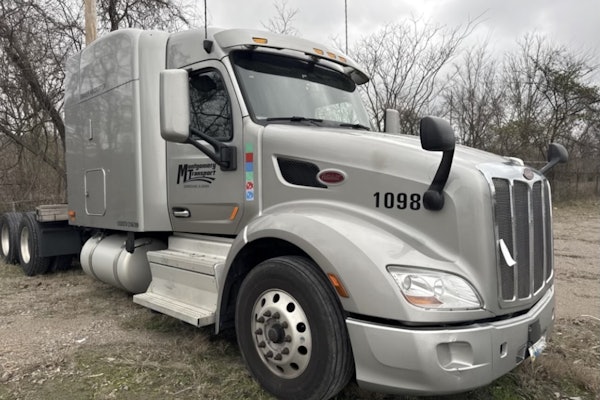The Bush administration has authorized Mexican citizens – including Mexican motor carriers – to establish or buy U.S. carriers involved in transportation of cargo between Mexico and points in the United States. President Bush’s action implements a key provision of the North American Free Trade Agreement (NAFTA). The Federal Motor Carrier Safety Administration will process applications for operating authority submitted by companies located in the United States and owned by Mexican citizens.
Consistent with NAFTA’s provisions, U.S. citizens already gained the right to own 51 percent of similar Mexican companies. U.S. citizens will be permitted 100 percent ownership of these Mexican companies beginning Jan. 1, 2004.
Under the terms of NAFTA, Mexican citizens were to have had the right in December 1995 to establish carriers in the United States to haul international cargo. Citing safety and other concerns, however, the United States delayed implementation. Following the NAFTA arbitration panel’s ruling in favor of Mexico and subsequent meetings between U.S. and Mexican officials, the U.S. government agreed to take steps to allow full access by the beginning of 2002, including expanded access to U.S. markets by carriers, drivers and trucks based in Mexico. (Dispatch, June 2001).
Meanwhile, many Democrats in Congress have refused to accept as a done deal increased access to the United States by Mexican trucks and drivers. In a letter to President Bush, 10 Democratic senators, including new Majority Leader Tom Daschle, D-S.D., urged a delay in operating authority for Mexican trucks until the “safety of the operator and the traveling public can be fully assured.” The senators are concerned that under the Department of Transportation’s proposed rules, Mexican carriers would not be subject to safety reviews until 18 months after the border opens. They also expressed concern that there will not be enough inspectors and facilities in place in time for the planned opening and that Mexico does not have hours-of-service rules or sufficient other truck safety laws.
In deciding to allow Mexican truckers to own U.S. carriers involved in cross-border traffic, Bush exercised his power under the moratorium legislation to modify the ban. Under the Bush order, FMCSA was authorized, effective June 5, to grant operating authority to Mexican-owned U.S. carriers to operate between Mexico and any place in the United States. The order also ordered FMCSA to “accept and expeditiously process applications.” Authority for Mexican trucks and drivers to operate throughout the United States will require a further modification of the moratorium.
Analyst sees second-half upturn
The trucking industry has passed through the worst period in its nearly year-long business slowdown and things will pick up in the second half of the year, a leading transportation logistics specialist says. But while shipments will improve, and price pressure will ease, the industry will see more casualties and bankruptcies, especially among truckload carriers, says Robert Delaney, vice president of Cass Information Systems Inc. Most of those bankruptcies will be among owner-operators or companies with only a few units, he predicts.
Delaney made his forecast as part of his 12th annual “State of Logistics Report,” which he delivered in Washington. He said the recent slowdown, which he called a recession for trucking, was the worst since the 1981-1982 industry recession in the wake of the industry’s deregulation.
With the demand for trucking services declining “suddenly and significantly” during the second half of 2000, there were a record number of trucking company failures last year, Delaney said. Coupled with the slowdown were higher interest rates and insurance costs, the continued driver shortage and sharply higher fuel prices, resulting in more than 3,600 bankruptcies in the industry last year – an increase of 35.5 percent over the previous high in 1997, Delaney said.
“In addition, truckload motor carriers are also challenged by excess capacity of tractors, declining market value of used equipment due to the over capacity glut and an increase of rail intermodal competition,” Delaney said.
Despite the pain, the trucking industry’s share of the nation’s freight revenues continued to rise slightly, reaching 81.5 percent in 2000, Delaney said. And the domestic economy’s overall trucking costs rose by $31 billion last year to $481 billion – nearly half of the economy’s total logistics costs of just over $1 trillion. Transportation costs as a percentage of gross domestic product slipped slightly to 5.9 percent from 6 percent, a symptom of lower growth due to the economic slowdown. The figure had stood at 6 percent for seven years.
ATA names Road Team
Twelve truck drivers from 10 trucking companies and a dozen different states have been selected to represent the trucking industry as America’s Road Team during 2001 and 2002. The selections were made in June. American Trucking Associations, which created and manages the group of industry ambassadors, started the Road Team to promote safety and improve public perceptions of truckers and the industry.
The 2001-2002 Road Team includes:
Paul Barnes, Pottle’s Transportation Inc., South Portland, Maine
David Bowers, Yellow Freight Systems, Clarksburg, W.Va.
Michael Bridgman, Ryder System Inc., Pasadena, Md.
James Curtis, ABF Freight Systems Inc., Albuquerque, N.M.
Ina Daly, Con-Way Western Express, Tolleson, Ariz.
Daniel Hiser, ABF Freight Systems Inc., Jacksonville, Ark.
Robert Kleinschmidt, Con-Way Central Express, Ann Arbor, Mich.
Charles McClellan, M.S. Carriers Inc., Louisville, Ky.
Daniel Poole, The Boeing Company, Renton, Wash.
Howard Shields, Schneider National Inc., Knoxville, Tenn.
Robert St. John, Jevic Transportation Inc., Tabernacle, N.J.
Jennifer Zinkel, FedEx Ground, Peoria, Ill.
In past years, members have testified before Congress and in government hearings. In 2000, for example, America’s Road Team captains participated in more than 160 events and conducted 216 media interviews.
The team was whittled down to 36 from more than 100 candidates who were nominated by trucking companies all over the United States. Those finalists came to ATA’s headquarters to compete for the final 12 spots. Candidates gave speeches, conducted personal interviews and participated in mock media interviews.
The 12 captains have more than 20 million accident-free miles among them.
Gigou moves to Volvo
Michel Gigou, who has served as president of Mack Trucks since 1996, has been named president and chief executive officer of Mack’s sister company, Volvo Trucks North America. Succeeding Gigou at Mack is Paul Vikner, who began his career at Mack in 1972. Volvo Trucks North America and Mack Trucks are part of Volvo Global Trucks. Volvo AB purchased Renault V.I., including Mack.
Since 1972, Gigou has held management positions in sales and aftermarket for Renault in France, Sweden, and the U.K. At Mack, he was credited with four consecutive years of market share growth in North America. Vikner worked for Mack from 1972 to 1979 and held various management positions with Iveco, Isuzu Truck and American Isuzu Motors before returning to Mack in 1995 as senior vice president – sales. Most recently, he was executive vice president – sales and marketing.
ATA chairman sees ‘business as usual’
Don’t expect the departure of Walter McCormick as president of the American Trucking Associations to result in significant changes to the organization’s mission. “I think it’s business as usual,” says ATA Chairman Duane Acklie. “I don’t think our priorities and issues will change. I think the members are very satisfied with the agenda, which is primarily advocacy, education and communicating what our industry does for the nation,” Acklie told CCJ.
McCormick announced June 1 that he was leaving ATA to become president of the U.S. Telecom Association. An 11-member search committee appointed by Acklie expects to recommend a replacement by Oct. 1. The goal is to obtain final approval of the choice at the general membership and management committee meeting October 30.
“The person we’re looking for will be a great leader with communications and human resources skills, and have some knowledge of the political and legislative scene,” Acklie says. “Some industry or association knowledge would be helpful, and probably some experience in managing an advocacy effort would also be a very helpful trait,” he says.
Acklie doesn’t plan to limit the search to the Washington area. “We’ll probably have applications from people from outside, possibly former state governors whose terms are up. I’m sure we’ll have people who have served in Congress. We’ll have people from other associations.”
From the early days in his tenure, McCormick sought a restructuring of ATA by cutting staff and narrowing the association’s focus toward legislative, regulatory, judicial and media advocacy. In so doing, ATA slashed dues in an effort to dramatically increase membership. To date, that initiative hasn’t worked as intended. But perhaps the most controversial move during McCormick’s tenure was a plan to absorb the various industry-sector conferences that were affiliated with ATA, but whose members did not have to belong to ATA. Several conferences, including the Truckload Carriers Association, chose to remain independent.
Court: Law gave IG new powers
The Department of Transportation’s Inspector General did not have authority to conduct searches and seizures of motor carrier safety records until enactment of a 1999 law, the U.S. Court of Appeals for the District of Columbia ruled last month. The case involved a series of IG raids in 1998 on five carriers in Virginia, Pennsylvania, Iowa and Arizona, in which officials searched the offices and seized a number of carrier business records. The law in effect at the time permitted the IG to use its search and seizure powers only to investigate the operations and programs of the department and its agencies – not individual carriers, the court said.
The Motor Carrier Safety Improvement Act of 1999 states that the IG’s powers include “authority to conduct, pursuant to Federal criminal statutes, investigations of allegations that a person or entity has engaged in fraudulent or other criminal activity” relating to agency programs. That power “extends to any person or entity subject to the laws and regulations” of the department or its agencies.
Truckers United For Safety, which brought the suit, lost its bid for an injunction against future investigations. The court ruled that the 1999 law contained authority “broad enough to encompass the kind of investigations at issue here.”
The IG’s office conducts fewer than 15 motor carrier investigations a year, “focusing only on those committing the most serious violations,” says DOT IG spokesman David Barnes.
Surcharge bill introduced
Rep. Nick Rahall, D-W.Va., introduced legislation (H.R. 2161) that would require fuel surcharges in truckload transportation once the price of fuel surpasses $1.15. A similar bill (H.R. 4441) sponsored by Rahall and passed by the House last year would have mandated a fuel surcharge once the fuel price exceeded the 52-week average by at least 5 cents. The bill requires the party paying the transportation charges to pay the surcharge, which would go to the party paying for the fuel.
The revised legislation reflects, in part, discussions between the Owner-Operator Independent Drivers Association, which spearheaded the surcharge bill, and the Truckload Carriers Association. TCA members believed the original bill did not adequately compensate truck operators for high fuel prices.
“In the last 18 months, the price of diesel fuel has risen more than 50 cents per gallon over 1999 levels,” Rahall said in introducing the bill. “While the price spikes have hurt the entire trucking industry, no one is hurt like the little guy. Fuel is the single biggest operating cost of a small business trucker and accounts for up to one-third of their budget.”








